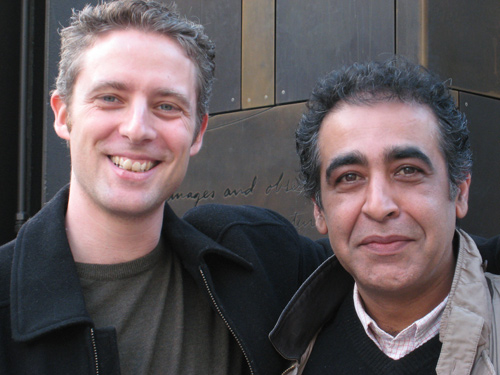Amy & I had a good time in Seattle. I was much more of a tourist than I was in my first two trips there. We spent plenty of time downtown during this trip, and I barely recall seeing any of that in 2001 or 2002, when I spent more time in neighborhoods, dive bars, and the offices of comics publishers.
If you rolled through my pix already, then you saw that we went up the Space Needle, meandered around the EMP, and took a million snaps in and around the Rem Koolhaas-designed Public Library. Before we got to all that, though, we made time for friends.
We had lunch Thursday with the Brooding Persian, who left Teheran for Seattle a while back. As you may or may not recall (thank gosh for hyperlinks), he went through a pretty rough stretch of mental illness last year. It turns out that he suffers from bipolar disorder, but also had other disorders, stemming from an autoimmune disease that was ravaging his mind. With medication and therapy, he feels that his condition is “under control,” but that’s a far cry from being well. (He gives profuse thanks to you readers who offered suggestions for how best to get help.)
I hadn’t seen him in four years, but it seems that his experiences haven’t aged him outwardly. Inside, though, it’s another story. I wasn’t prepared for his intense, thoughtful pauses, nor for the quietness of his voice. I remember vociferous arguments with him in graduate school, good-spirited but finger-waggingly authoritative. The 2007 edition appeared much more wrapped up in his own thoughts, less certain. I chose to see that as pensiveness, rather than shatteredness or medicated-into-zombie-ness. It’s a tough distinction to make, but I felt there was plenty in him, just more reticence about letting it out.
And as lunch progressed, he started to unfold a bit, expressing stronger opinions about our world and his world. He explained to us that the most important lesson he learned from the last few years was the absolute fragility of human being. All of our will and our drive for self-definition, he said, can be short-circuited so easily (I paraphrase slightly).
At one point, he expressed nostalgia for the highs of his manic phases, in a manner similar to the way some addicts I’ve known pined for the early days of their drug use. Before, of course, It All Spun Out Of Control.
Over coffee, I asked him a question about his favorite book, which I brought with me on this trip. I asked, “How do you understand the role of the gods in the Iliad?”
It had been a few years since he read it, and he was afraid that gaps in his memory might undermine his response, but he talked confidently about the role of myth in explaining the natural world, of divinities that once expressed the deeper aspects of the mind (I was going to write “psyche” instead of “mind” just now, then realized that she was one of those divinities). We’re both more apprehensive about those passages in which the gods take an active, physical hand in matters, but we glossed over that part and talked instead about fate.
My friend told us about his initial autoimmune diagnosis in 1995, and how his doctor told him he had 10 years left in the world. He said that he lived with that death sentence, embracing life to the fullest, achieving many goals, including a meandering journey across the world. All accomplished, he moved back to Iran, ready to die in his homeland.
Except it didn’t happen. He took ill a number of times over the years, but kept recovering. After passing the decade-mark in relative good health, he found himself trying to figure out “what to do next.” He’s on 12 years now, and he’s still trying to figure that out now, as he pieces himself together.
In a sense, he’s been catching up with his own experiences, trying to recollect his life from the perspective of a non-manic personality. I can’t imagine the struggle that he’s gone through, nor where he goes from here.
As I continue my way through the Iliad, his condition puts me in mind of Achilleus on the beach. As the Achaians implore him to accept Agamemnon’s apology and gifts and return to war, he explains that he knows his fate — or, more accurately, his fates. He knows that he can return to combat, where he will achieve eternal glory, but be killed before the end of the war, or he can pack up and head home to Phthia, achieve less glory, but have a long life.
I think about my friend, and how his sentence was repealed (“postponed”, of course), and wonder how Achilleus would have handled such a situation. Imagine getting to the end of the war, and finding that, your divine mother’s prophecies to the contrary, you were still alive and heading home. What could there be to do after?
The Brooding Persian hasn’t led as eventful a life as Achilleus, but he’s been through plenty over the years, including the Iranian Revolution, madness, and having to deal with the likes of me in seminar.
I was happy to see him, but sad that I couldn’t offer anything beyond my friendship. An older student — well, 7 years older than I am — he had a much more distinct mind than many of our younger friends when we were in Annapolis. He seems almost veiled now, as if his silences, his ineffabilities, are a mist about his head.
Which didn’t stop me from having Amy snap a pic of us outside the restaurant:

And that was lunch. Dinner promised raw oysters and a reunion with my twin brother. Which is to say, more to come. . .

What a lovely and thoughtful piece of writing, Gil.